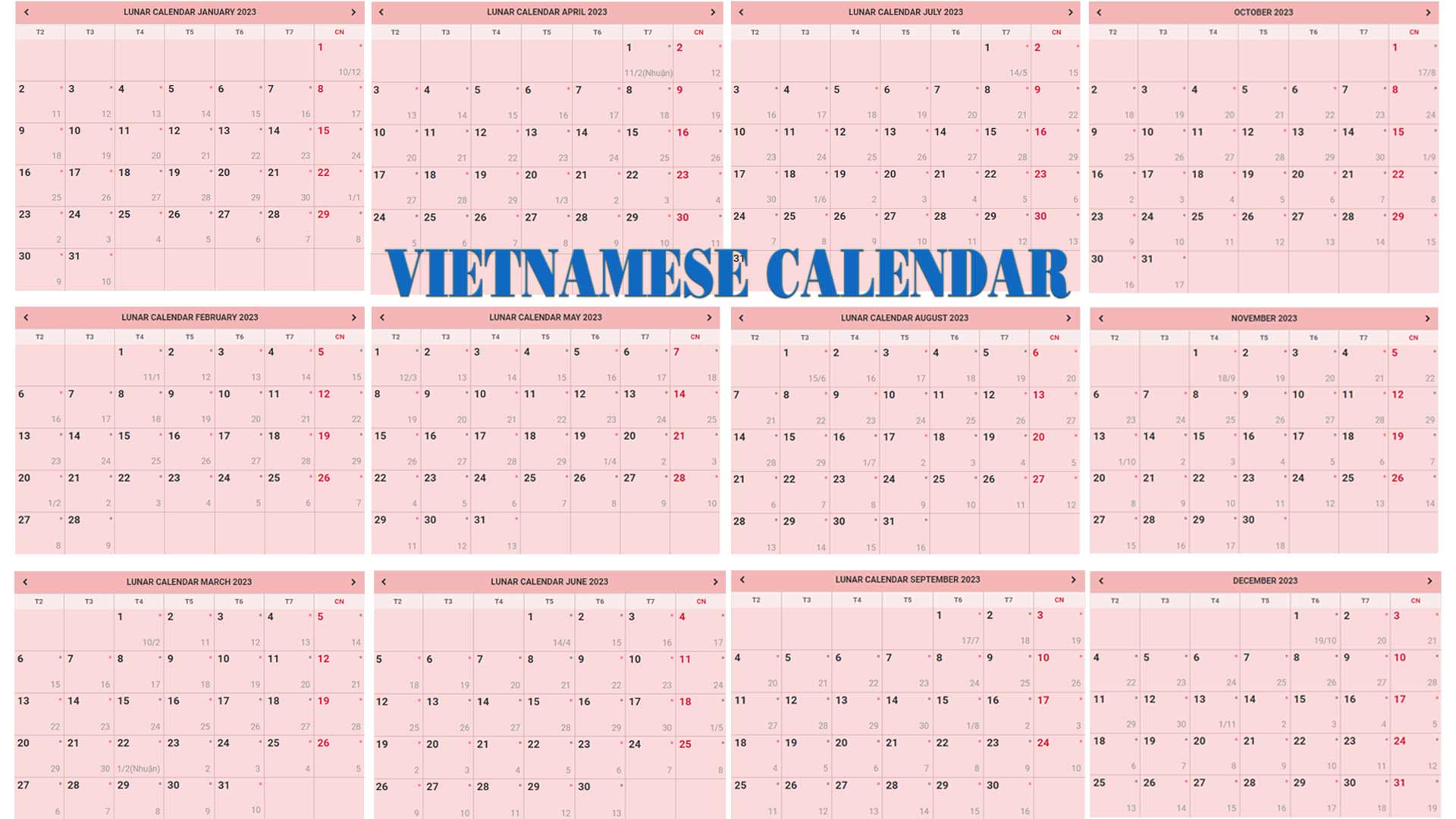View the current Vietnamese lunar calendar and important dates for holidays and celebrations. Easily switch between years, months, and days to find the lunar date for any occasion.
The Vietnamese lunar calendar is a lunisolar calendar that is mostly based on the Chinese lunar calendar. It is used mainly to observe lunar holidays and commemorations in Vietnam, such as Tết Nguyên Đán (Lunar New Year) and Tết Trung Thu (Mid-Autumn Festival). These festivals are not only celebrated by the Vietnamese people, but also by other ethnic groups and countries that share the same cultural and historical roots with Vietnam.
We will explore the Vietnamese lunar calendar in depth, from its history and origin, to its workings and calculations, to its cultural and traditional aspects, and to its conversion methods. By the end, you will have a better understanding and appreciation of the Vietnamese lunar calendar and how it reflects Vietnam's culture and traditions.
Vietnamese Lunar Calendar
The Vietnamese calendar is an important part of Vietnamese culture, as it not only serves as a way of marking time but also plays a significant role in traditional festivals, ceremonies, and daily life. Unlike the Western Gregorian calendar, the Vietnamese calendar is a lunisolar calendar that is based on the cycles of the moon as well as the sun. This means that the lunar months and years are slightly shorter than their solar counterparts, resulting in the lunar calendar shifting earlier each year. The Vietnamese calendar has a 12-year cycle of zodiac animals, each representing a different year and personality traits.
The Vietnamese Lunar Calendar Converter is a tool that allows users to easily convert dates between the solar (Gregorian) calendar and the lunar calendar. This is especially useful for individuals who follow the lunar calendar, such as those who celebrate traditional Vietnamese holidays.
How is the Vietnamese lunar calendar calculated?
The Vietnamese lunar calendar is calculated based on the motion of the Sun, the Earth, and the Moon. It is a kind of astronomical calendar that can be computed for any arbitrary year. To calculate the Vietnamese lunar calendar, you need to compute two things: any New Moon, and the Principal Terms (trung khí) of any year.
- A New Moon is a time when the Sun, the Moon, and the Earth are on the same line (hội diện). It occurs once every about 29.5 days. The first day of the lunar month (mùng một) is the one containing the New Moon.
- The Principal Terms are points that divide the ecliptic (đường hoàng đạo) into equal sectors. They are used to determine the leap months (tháng nhuận) and the names of the lunar months.
There are some rules to apply the New Moons and Principal Terms to determine the months and dates of the Vietnamese lunar calendar. For example:
- An ordinary year has twelve lunar months; an intercalary year has thirteen lunar months.
- The Winter Solstice always falls in month 11.
- In an intercalary year, a month in which there is no Principal Term is the intercalary month. It is assigned the number of the preceding month, with the further designation of intercalary.
- Calculations are based on the meridian 105° Eas.
Some of the benefits of using the Vietnamese lunar calendar are:
- It helps to preserve and celebrate the traditional culture and festivals of Vietnam, such as Tết Nguyên Đán and Tết Trung Thu, which are based on the lunar cycle.
- It allows people to observe the changes in nature and seasons more closely, as the lunar calendar is aligned with the solar terms (tiết khí) that mark the solstices, equinoxes, and other climatic phenomena.
- It provides a way of divination and fortune-telling based on the zodiac animals (con giáp) and the heavenly stems (can) and earthly branches (ky) that form the 60-year cycle of the lunar calendar.
- It offers a sense of connection and harmony with the Moon, the Sun, and the Earth, as well as with other countries and regions that use similar lunisolar calendars, such as China, Korea, and Japan.
There are some computer programs that can compute the Vietnamese lunar calendar with high precision (see here for some pointers). You can also use online tools such as https://huyhoa.net/en/vietnamese-calendar/ to display or convert between the Vietnamese lunar calendar and the Gregorian calendar
How to use the Vietnamese lunar calendar?
To use the Vietnamese lunar calendar, you need to understand some of its basic features and functions:
- The Vietnamese lunar calendar is a lunisolar calendar that is mostly based on the Chinese lunar calendar. It is used mainly to observe lunar holidays and commemorations in Vietnam, such as Tết Nguyên Đán (Lunar New Year) and Tết Trung Thu (Mid-Autumn Festival).
- The Vietnamese lunar calendar has 12 months of 29 or 30 days each, depending on whether the month has a new moon or not. The year totals 354 or 355 days, which is shorter than the solar year of 365 or 366 days.
- To synchronize the lunar calendar with the solar year, a leap month is added every 3 years. The leap month is a duplicate of the previous month, and it occurs after a month with two new moons. The leap month has no major festivals or events, except for some minor ones.
- The Vietnamese lunar calendar also has a 60-year cycle, which is composed of 10 heavenly stems and 12 earthly branches. Each year is named after a combination of a heavenly stem and an earthly branch, and each earthly branch is associated with a zodiac animal. For example, the year 2020 is Canh Tý (Metal Rat), and the year 2021 is Tân Sửu (Metal Ox).
- To use the Vietnamese lunar calendar, you can refer to online converters, apps, tables, charts, etc. that can help you convert the Vietnamese lunar calendar to the Gregorian calendar and vice versa. You can also check for leap months, time zones, festivals, events, etc. that are based on the Vietnamese lunar calendar.
Lunar Year and Zodiac Animals
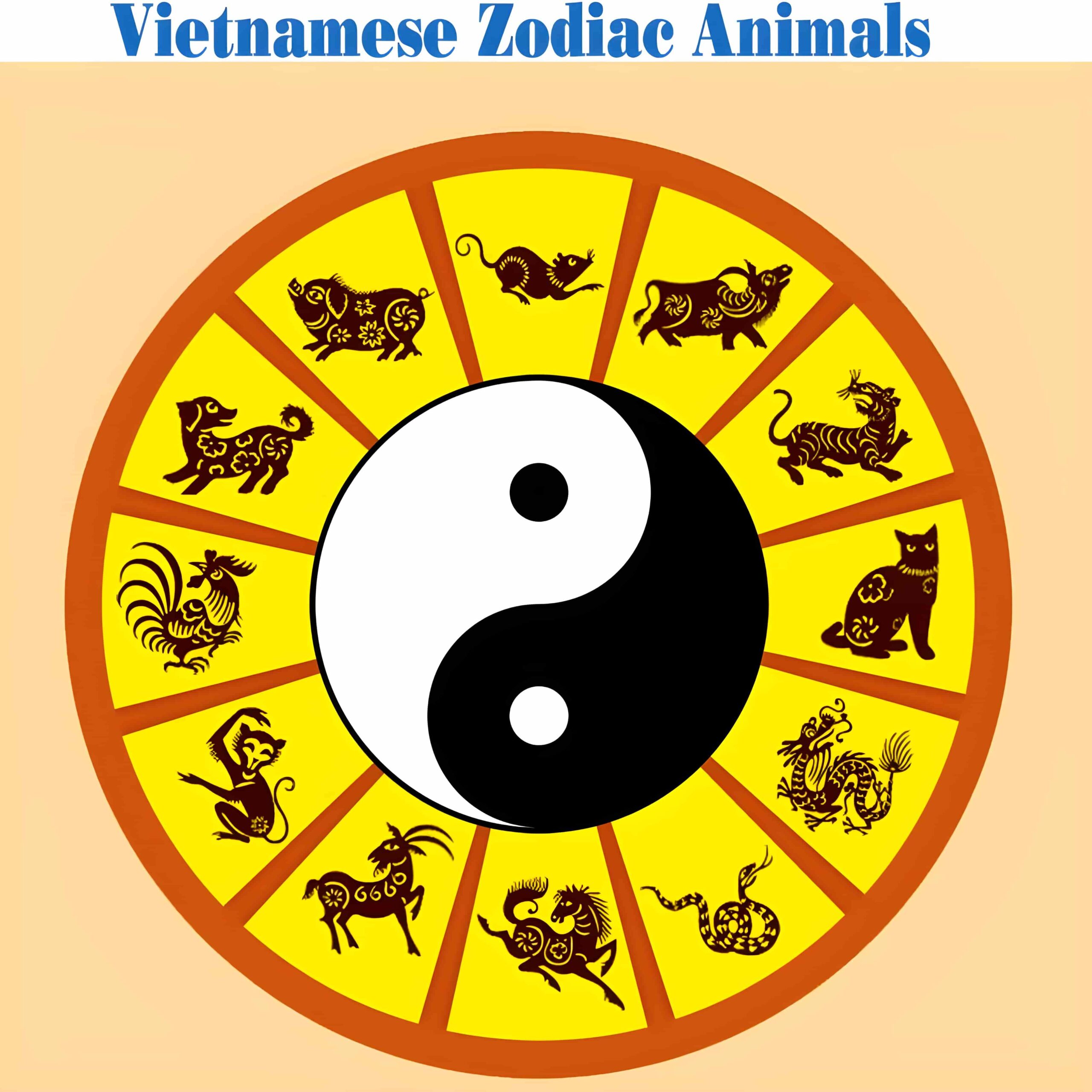
The Vietnamese calendar is a unique combination of lunar and solar cycles, which means it is based on both the phases of the moon and the solar year. The lunar year is made up of 12 lunar months, each lasting 29.5 days on average, which adds up to 354 days in total. This is approximately 11 days shorter than the solar year, which is why the Vietnamese calendar is considered a lunisolar calendar.
The Vietnamese zodiac is a 12-year cycle of animal signs that correspond to the lunar calendar. Each year is associated with a different animal sign, which is believed to have certain personality traits and characteristics that influence people born in that year. The 12 zodiac animals in the Vietnamese calendar are Rat, Ox, Tiger, Cat, Dragon, Snake, Horse, Goat, Monkey, Rooster, Dog, and Pig.
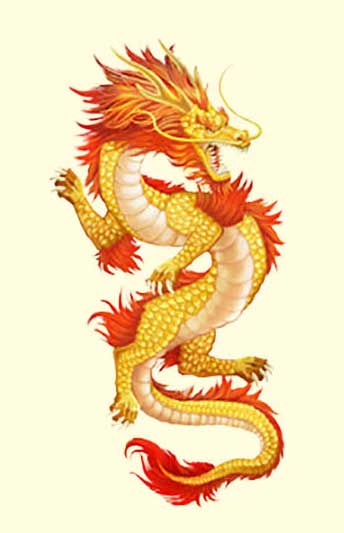
Each zodiac animal also has a corresponding element, which adds another layer of significance to the zodiac. The five elements are metal, water, wood, fire, and earth. For example, a person born in the Year of the Rat may be associated with the element of water, while a person born in the Year of the Horse may be associated with the element of fire.
The Vietnamese zodiac is widely used in Vietnamese culture, from astrology to naming conventions. Many parents choose to name their children after the zodiac animal associated with their birth year, and some people even choose to change their name to bring them luck based on their zodiac animal.
In addition to the zodiac animals, the Vietnamese calendar also has a 60-year cycle that combines the 12 zodiac animals with the five elements. Each year in the 60-year cycle has a unique name and is believed to have a different level of luck and fortune. This 60-year cycle is often used in traditional Vietnamese astrology and fortune-telling.
Lunar Festivals in Vietnam
The Vietnamese calendar is rich with traditional festivals that are based on the lunar cycle. These festivals are an important part of Vietnamese culture and are celebrated with great enthusiasm by people all over the country.
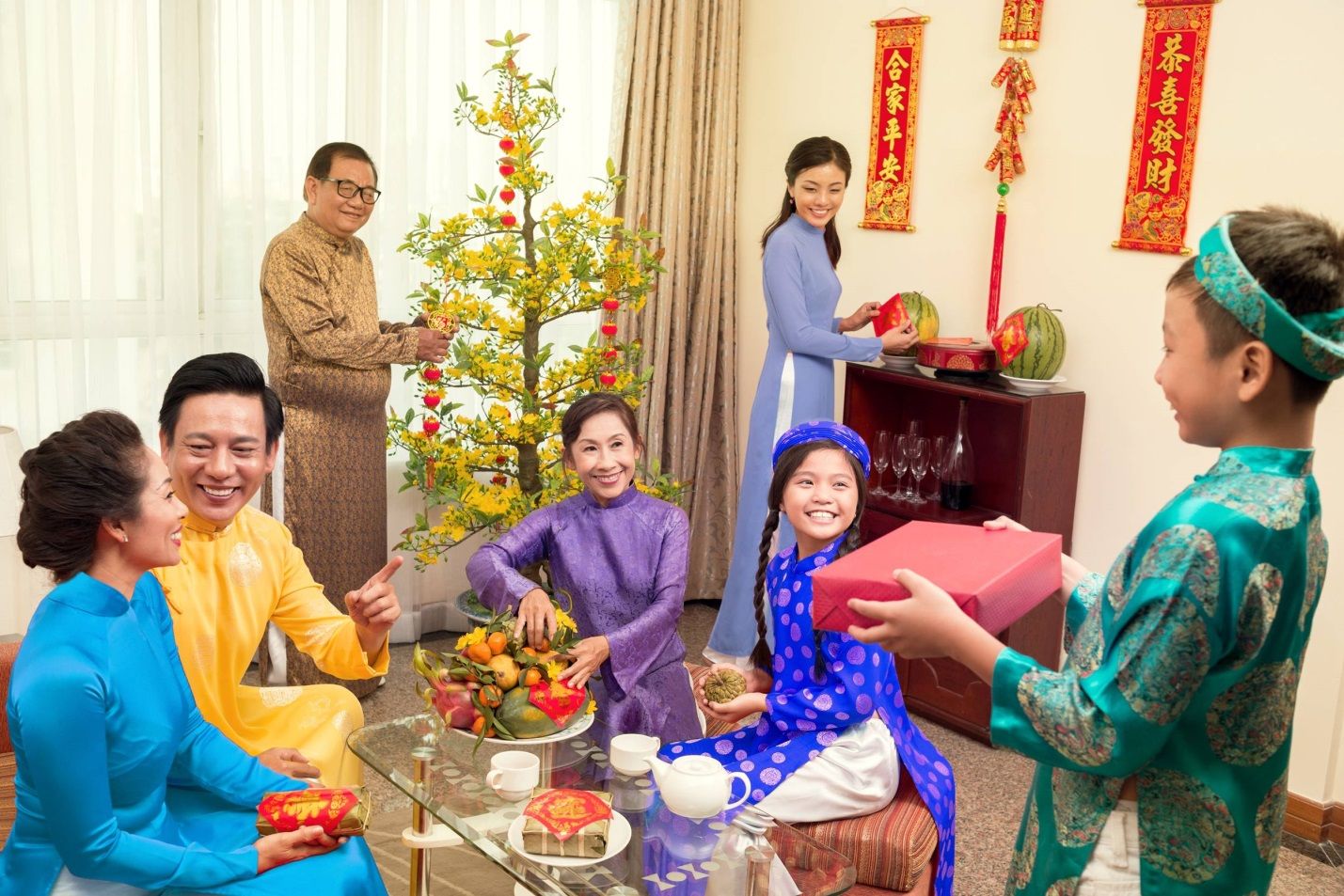
Here are some of the major lunar festivals in Vietnam:
- Tet Nguyen Dan (Lunar New Year): Tet Nguyen Dan, also known as Lunar New Year, is the most important festival in the Vietnamese calendar. It falls on the first day of the first lunar month and marks the beginning of the new year. The festival is celebrated with family reunions, traditional foods, and various customs such as giving red envelopes containing lucky money to children.
- Tet Trung Thu (Mid-Autumn Festival): Tet Trung Thu, also known as the Mid-Autumn Festival, is celebrated on the 15th day of the eighth lunar month. It is a time for family reunions and for children to enjoy mooncakes, lanterns, and lion dances. The festival also has a legend about a man who flew to the moon and reunited with his wife and children.
- Tet Trung Nguyen (Ghost Festival): Tet Trung Nguyen, also known as the Ghost Festival, is celebrated on the 15th day of the seventh lunar month. It is a time for Vietnamese people to honor their ancestors and the spirits of the dead. People offer food and flowers to the dead and burn incense to help guide their ancestors back to the afterlife.
- Tet Han Thuc (Cold Food Festival): Tet Han Thuc, also known as the Cold Food Festival, is celebrated on the third day of the third lunar month. It is a time for people to commemorate Jie Zitui, a loyal retainer of Duke Wen of Jin who refused to betray his master even when he was in exile. The festival is marked by eating cold food such as rice dumplings.
- Tet Doan Ngo (Dragon Boat Festival): Tet Doan Ngo, also known as the Dragon Boat Festival, is celebrated on the fifth day of the fifth lunar month. It is a time for people to ward off evil spirits and diseases by eating sticky rice dumplings wrapped in leaves and drinking wine. It is also a time for dragon boat races in many parts of the country.
- Tet Trung Cuu (Double Ninth Festival): Tet Trung Cuu, also known as the Double Ninth Festival, is celebrated on the ninth day of the ninth lunar month. It is a time for people to show respect to the elderly and to ward off bad luck. The festival is marked by climbing mountains, eating chrysanthemum cakes, and drinking chrysanthemum wine.
Each of these festivals has its own unique traditions and customs that are deeply rooted in Vietnamese culture. By understanding these festivals, visitors can gain a deeper appreciation of Vietnamese culture and history.
How to Use the Lunar Calendar?
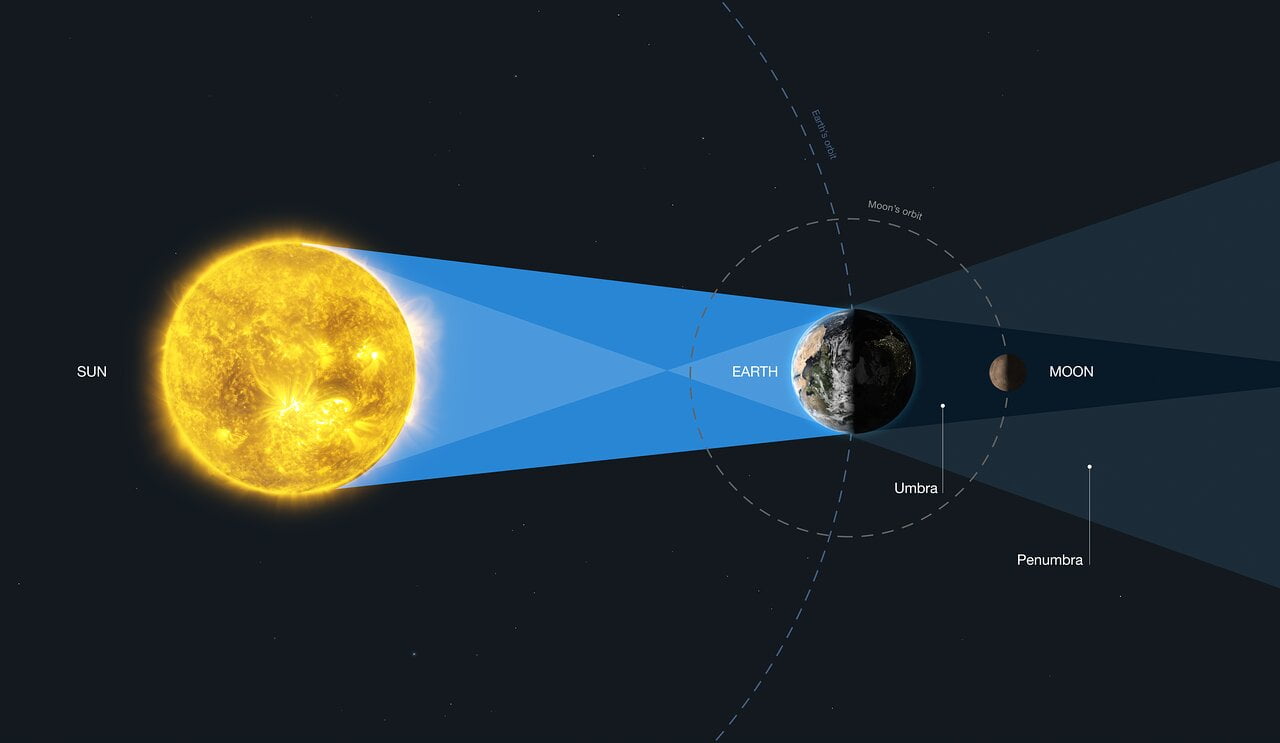
The Vietnamese lunar calendar has been used for thousands of years and is an integral part of Vietnamese culture. It is used to determine auspicious dates for important events like weddings, housewarming, and business openings.
Here are some tips on how to use the lunar calendar:
- Understand the basics of the lunar calendar: The lunar calendar is based on the cycles of the moon and has 12 months of 29 or 30 days each. This means that the lunar year is about 11 days shorter than the solar year. The lunar calendar is used alongside the solar calendar, so it’s important to understand the differences between the two.
- Know the zodiac animals and their meanings: The Vietnamese lunar calendar is based on a 12-year cycle of zodiac animals, each representing a different year. The zodiac animals are the Rat, Ox, Tiger, Rabbit, Dragon, Snake, Horse, Goat, Monkey, Rooster, Dog, and Pig. Each animal has its own strengths and weaknesses and is associated with certain characteristics and personalities.
- Choose auspicious dates for important events: The lunar calendar is used to choose auspicious dates for important events like weddings, housewarmings, and business openings. Certain dates are considered lucky or unlucky based on the zodiac animals, the lunar phases, and the elements. For example, the year of the Dragon is considered lucky for weddings, while the year of the Snake is considered unlucky.
- Avoid unlucky days: In addition to choosing auspicious dates, it’s also important to avoid unlucky days. Certain days are considered inauspicious for certain activities, like moving house or starting a business. The lunar calendar can help you determine which days to avoid based on the zodiac animals and lunar phases.
- Use the lunar calendar to plan for festivals and holidays: The lunar calendar is also used to determine the dates of festivals and holidays in Vietnam. For example, Tet Nguyen Dan (Lunar New Year) is celebrated on the first day of the lunar calendar, while Tet Trung Thu (Mid-Autumn Festival) is celebrated on the 15th day of the 8th lunar month. By using the lunar calendar, you can plan ahead and prepare for these important events.
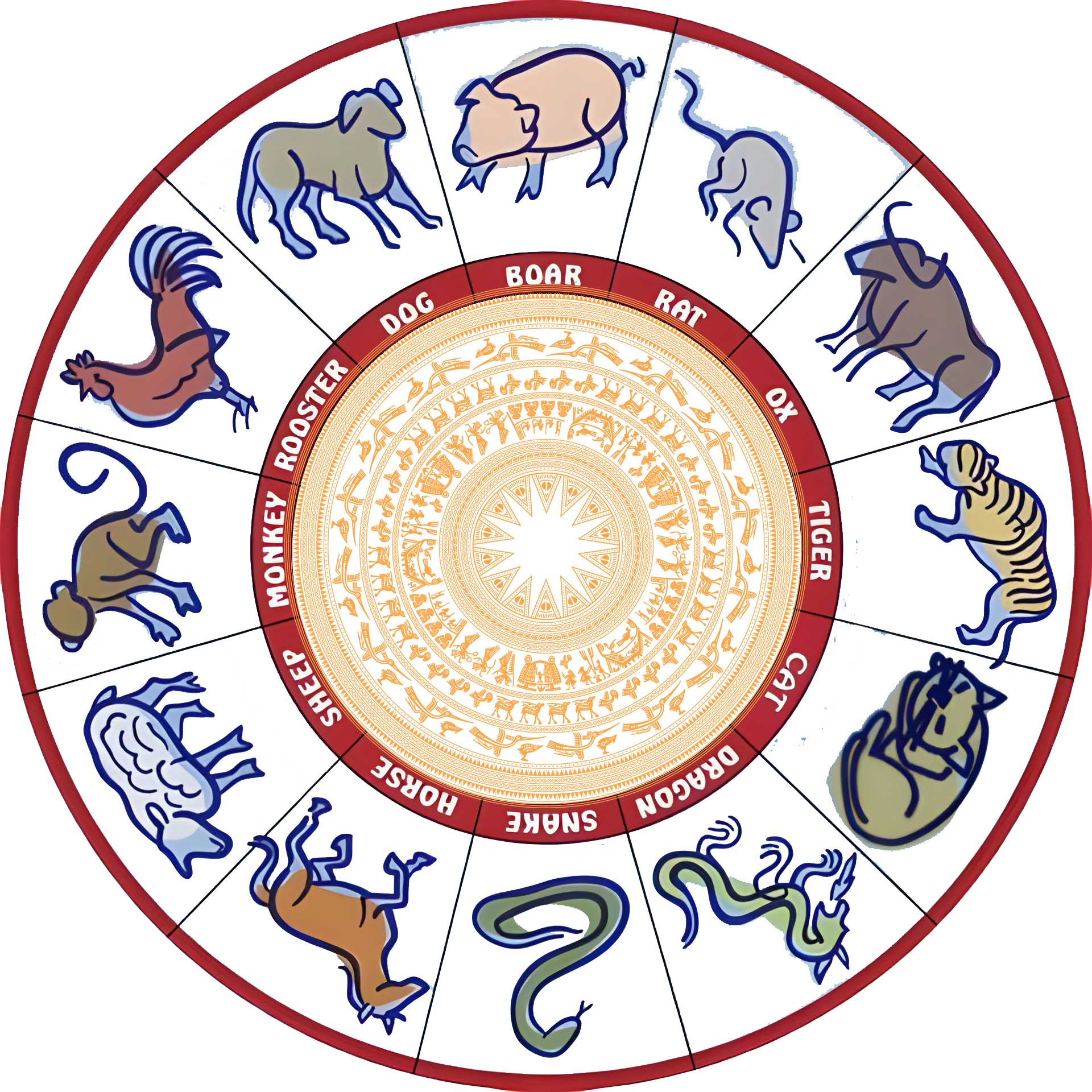
Contribute
We acknowledge that this page contains some terminologies of Feng Shui and horoscopes originating from Eastern culture, which we may have inadequately translated. We welcome and appreciate any advice and suggestions you may have to offer, in order for us to improve the quality of our content. Thank you for your valuable input.
Please find below a list of some of the terminologies used in this article:
Giờ hoàng đạo: All relevant terms in this article such as: “auspicious hours”, “propitious hours”, “favorable hours”, “lucky hours”, “good hours”, or “auspicious times” are interpreted as “giờ hoàng đạo”.Xuân phân: Chunfen, Spring Equinox
Thanh minh: Qingming Festival or Tomb Sweeping Day.
Lập hạ: Lixia, Summer Begins, Summer Commences
Cốc vũ: Guyu, Gǔyǔ, Kokuu, Gogu
Tiểu mãn: Xiaoman, Shōman, Soman
Mang chủng: Mangzhong, Bōshu, Mangjong
Hạ chí: Summer solstice,
Tiểu thử: Xiaoshu, Shōsho, Soseo
Đại thử: Dashu (solar term), Taisho, Daeseo
Lập thu: Liqiu, Risshū, Ipchu
Xử thử: Chushu, Shosho, Cheoseo
Bạch lộ: Bailu (solar term), Hakuro, Baengno
Thu phân: Qiufen, Shūbun, Chubun
Hàn lộ: Hanlu, Kanro, Hallo
Sương giáng: Shuangjiang (solar term), Sōkō, Sanggang
Lập đông: Lidong, Rittō, Ipdong
Tiểu tuyết: Xiaoxue,
Đại tuyết: Daxue (solar term),
Đông chí: Dongzhi (solar term), Tōji, Dongji, Tunji
Tiểu hàn: Xiaohan, Shōkan, Sohan
Đại hàn: Dahan (solar term), Daikan, Daehan
Lập xuân: Lichun, Lìchūn, Risshun, Ipchun
Vũ thủy: Yushui (solar term), Usui, Usu
Kinh trập: Jingzhe,
Tết đoan ngọ: Doan Ngo Festival, Double Fifth Festival
Ông Táo chầu trời: Kitchen God Worship Festival
Giáp (甲): Yang Wood
Ất (乙): Yin Wood
Bính (丙): Yang Fire
Đinh (丁): Yin Fire
Mậu (戊): Yang Earth
Kỷ (己): Yin Earth
Canh (庚): Yang Metal
Tân (辛): Yin Metal
Nhâm (壬): Yang Water
Quý (癸): Yin Water
FAQs
What are the important dates in the Vietnamese lunar calendar?
Some of the important dates in the Vietnamese lunar calendar are:
- Tết Nguyên Đán (Lunar New Year): This is the most important and celebrated festival in Vietnam. It marks the beginning of a new lunar year and a fresh start for everyone. It usually falls in late January or early February of the solar calendar and lasts for about a week. During this time, people visit their relatives and friends, exchange gifts and lucky money, decorate their homes with flowers and fruits, and enjoy traditional foods and activities.
- Tết Hàn Thực (Cold Food Festival): This is a festival that commemorates a loyal friend who died while saving his lord from a fire. It falls on the third day of the third lunar month, which is usually in March or April of the solar calendar. On this day, people avoid using fire and eat only cold food, such as rice cakes and fruits. They also pay respect to their ancestors and sweep their tombs.
- Tết Thanh Minh (Tomb-Sweeping Festival): This is a festival that honors the dead and shows filial piety to one's ancestors. It falls on the 15th day of the third lunar month, which is usually in April of the solar calendar. On this day, people visit their ancestors' graves, clean them, offer food and incense, and pray for their blessings. They also enjoy outdoor activities such as flying kites and picnicking.
- Tết Đoan Ngọ (Duanwu Festival): This is a festival that celebrates the summer solstice and commemorates a patriotic poet who drowned himself in protest of a corrupt regime. It falls on the fifth day of the fifth lunar month, which is usually in June of the solar calendar. On this day, people eat sticky rice dumplings wrapped in bamboo leaves, drink realgar wine, and watch dragon boat races. They also ward off evil spirits and diseases by hanging herbs and wormwood on their doors.
- Tết Trung Thu (Mid-Autumn Festival): This is a festival that celebrates the harvest season and the full moon. It falls on the 15th day of the eighth lunar month, which is usually in September or October of the solar calendar. On this day, people admire the moon, eat mooncakes and fruits, light lanterns, and enjoy lion dances and other performances. It is also a special occasion for children, who receive gifts and toys from their parents and elders.
What are the differences between the Vietnamese lunar calendar and the Gregorian calendar?
The Vietnamese lunar calendar and the Gregorian calendar are two different ways of measuring time. The Vietnamese lunar calendar is a lunisolar calendar that is used mainly to observe lunisolar holidays and commemorations, such as Tết Nguyên Đán and Tết Trung Thu. The Gregorian calendar is a solar calendar that is calculated based on the time for the Earth to go around the Sun. It is used for work and international business in Vietnam.
Some of the differences between the two calendars are:
- The Vietnamese lunar calendar has 12 or 13 months in a year, depending on whether it is a leap year or not. The Gregorian calendar has 12 months in a year, regardless of leap years.
- The Vietnamese lunar calendar has 29 or 30 days in a month, depending on the phases of the Moon. The Gregorian calendar has 28, 29, 30 or 31 days in a month, depending on the month and leap years.
- The Vietnamese lunar calendar usually starts a month later than the Gregorian calendar. For example, a new lunar year can start in late January or early February of the solar year.
- The Vietnamese lunar calendar has a zodiac system with 12 animals that represent each lunar year. The Gregorian calendar does not have a zodiac system.
What is my zodiac animal according to the Vietnamese lunar calendar?
Your zodiac animal according to the Vietnamese lunar calendar depends on the year of your birth. The Vietnamese lunar calendar has 12 zodiac animals arranged in a fixed order: Rat, Buffalo, Tiger, Cat, Dragon, Snake, Horse, Goat, Monkey, Rooster, Dog, and Pig. Each zodiac animal corresponds to 12 hours in one day and 12 months in another year. For example, if you were born in 2008, your zodiac animal is the Rat (Mậu Tý), which corresponds to the first hour of the day (11 pm to 1 am) and the first month of the year (late January to late February).
To find out your zodiac animal, you need to know your lunar birth year, which may be different from your solar birth year. For example, if you were born on 27 June 2010 according to the solar calendar, you can enter this date in and select "Gregorian to Lunar". Then you will get 16 May 2010 as your lunar birth date. This means you were born in the Year of the Tiger (Canh Dần) according to the Vietnamese lunar calendar.
Each zodiac animal has its own characteristics and personality traits that are believed to influence the people born under that sign. For example, people born in the Year of the Rat are said to be clever, adaptable and sociable; people born in the Year of the Buffalo are said to be diligent, loyal and persistent; people born in the Year of the Tiger are said to be courageous, charismatic and ambitious; and so on.
How is the Vietnamese lunar calendar used today?
The Vietnamese lunar calendar is used today mainly to observe lunisolar holidays and commemorations, such as Tết Nguyên Đán (Lunar New Year), Tết Trung Thu (Mid-Autumn Festival), and Giỗ Tổ Hùng Vương (Hung Kings' Temple Festival). These holidays are important for the Vietnamese people as they celebrate their traditional culture, history and religion.
It is also used to determine the dates of birth and death of the ancestors, as well as the auspicious days for weddings, funerals, house-moving, and other important events. The Vietnamese lunar calendar also influences the zodiac signs and the fortune-telling of the people, as each year, month, day and hour is associated with a certain animal and element.
The Vietnamese lunar calendar is not used for work and international business, as the official calendar of Vietnam is the Gregorian calendar since 1954. The Vietnamese lunar calendar is also not very accurate in predicting the seasons and weather, as it does not account for the differences in longitude and climate between Vietnam and China.
What are the origins of the Vietnamese lunar calendar?
The lunar calendar used in Vietnam (which should be more accurately called the lunisolar calendar) is a type of calendar that originated in China.
All lunar calendars are calculated based on the same basic principles: the lunar month starts on the New Moon day; the leap month is placed in the month without a Principal Term.
In history, there were many periods when the Vietnamese used the Chinese calendar, but there were also many times when they calculated their own lunar calendar.
Although based on the same general principles, the lunar calendars of Vietnam and China can differ from each other because of the different ways of applying the principles (for example, determining the New Moon and the Principal Term based on the actual or average motion; or calculating the calendar according to different time zones).
When reading ancient Vietnamese historical works, we can see that sometimes the dates written in them are different from the dates in the Chinese lunar calendar.
Some months in Vietnamese history are recorded as leap months, but in the Chinese calendar, they are not. Some months are short according to the Vietnamese calendar, but long according to the Chinese calendar, and vice versa.
Based on the results of a thorough research on calendars and Vietnamese calendars by Professor Hoang Xuan Han, we know which calendar was used in Vietnam before 1945 and how it differed from the Chinese calendar at which stages.
The period of Northern domination: The Chinese calendar was used in Vietnam.
From the Ngo dynasty to the early Ly dynasty (about 939-1078): Perhaps the first independent dynasties of Vietnam still used the Chinese calendar.
Ly and Tran dynasties (1080-1300): Vietnam calculated its own calendar (according to a calendar method of the Song dynasty in China). There were many differences between the Vietnamese and Chinese calendars in this period. Unfortunately, there is not enough historical material to restore this calendar.
Tran, Ho, and Le dynasties (1306-1644): In this period Vietnam used a calendar similar to that of the Yuan and Ming dynasties in China (perhaps the Vietnamese learned the Shou Shi calendar method when they went to Yuan around 1300 and then they could calculate their own calendar). Even during the Trinh-Nguyen conflict (from 1627 onwards), Nguyen lords in the South still used the same calendar as Le-Trinh. In 1384, the Ming dynasty in China changed the name of the Shou Shi calendar to Da Tong but kept the same calculation method. Until the end of the Ming dynasty (1644), there was no difference between Vietnamese and Chinese calendars.
From the Trinh-Nguyen conflict to the early Nguyen dynasty (1645-1812): Vietnam used its own calendar, calculated according to the Da Tong method. In China, in 1644, the Qing dynasty came to power and used a new calendar method (Shi Xian). The Vietnamese and Chinese calendars differed a lot during this period.
Tay Son period (1789-1801): It is not clear what kind of calendar Tay Son used because their documents were later destroyed. Perhaps Tay Son switched to using a calendar similar to the Qing dynasties in China. In the area controlled by Nguyen lords during this period, they still used the Le dynasty's calendar (calculated according to the Da Tong method). After Gia Long ascended to the throne, he maintained the old calendar (called Van Toan) until 1812.
Nguyen dynasty and French colonization (1813-1945): Used Hiep Ky calendar (calculated according to the Shi Xian method of the Qing dynasty). There was no difference between Vietnamese and Chinese calendars.
The period of the resistance war against France (1946-1954): Perhaps Vietnam no longer had its own agency to calculate calendars, so they made calendars according to Wan Nian Shu's books of China. Thus, there was no difference between Vietnamese and Chinese calendars.
The period of two regions divided (1955-1975): Lunar calendars in North and South Vietnam differed from each other (and from the Chinese calendar) due to different time zones used for calculation. In North Vietnam, they used time zone 8 until 1967 and time zone 7 from 1968 onwards. In South Vietnam, they used time zone 8.
From 1976 onwards: The whole country of Vietnam calculated the lunar calendar according to time zone 7. Due to different time zones, there were many differences between Vietnamese and Chinese calendars.
Note: From 1943 to 1967, there were a few changes in the official time zone, but perhaps the change of time zone only affected the calculation of hours and not the calculation of lunar dates.From 01/01/1943, they followed time zone 8 (GMT+8, one hour earlier than standard time). From 1/4/1945, they followed the Japanese time zone 9.
From 1/4/1947, they returned to time zone 8. In South Vietnam, from 1/7/1955, they used time zone 7, then from 1/1/1960, they returned to time zone 8. In North Vietnam, from 8/8/1967 onwards, they used time zone 7 (before that they followed time zone 8). It was not until 1968 in North Vietnam and from 1976 in the whole country that the lunar calendar was calculated based on Vietnam's standard time zone.
- References:
- Image credits: Internet

